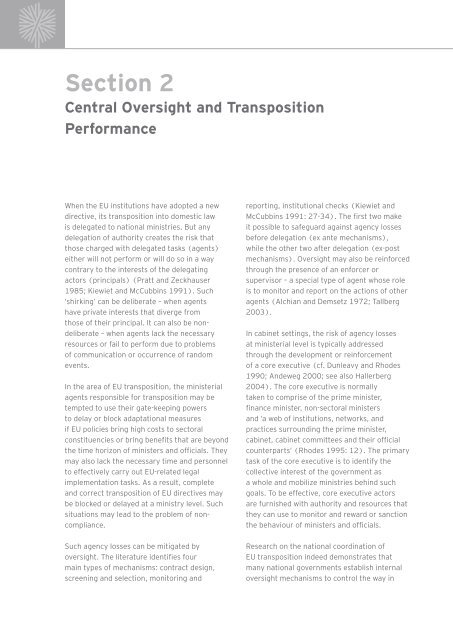Complying with EU Law: - Ernst & Young
Complying with EU Law: - Ernst & Young
Complying with EU Law: - Ernst & Young
Create successful ePaper yourself
Turn your PDF publications into a flip-book with our unique Google optimized e-Paper software.
Section 2Central Oversight and TranspositionPerformanceWhen the <strong>EU</strong> institutions have adopted a newdirective, its transposition into domestic lawis delegated to national ministries. But anydelegation of authority creates the risk thatthose charged <strong>with</strong> delegated tasks (agents)either will not perform or will do so in a waycontrary to the interests of the delegatingactors (principals) (Pratt and Zeckhauser1985; Kiewiet and McCubbins 1991). Such‘shirking’ can be deliberate – when agentshave private interests that diverge fromthose of their principal. It can also be nondeliberate– when agents lack the necessaryresources or fail to perform due to problemsof communication or occurrence of randomevents.In the area of <strong>EU</strong> transposition, the ministerialagents responsible for transposition may betempted to use their gate-keeping powersto delay or block adaptational measuresif <strong>EU</strong> policies bring high costs to sectoralconstituencies or bring benefits that are beyondthe time horizon of ministers and officials. Theymay also lack the necessary time and personnelto effectively carry out <strong>EU</strong>-related legalimplementation tasks. As a result, completeand correct transposition of <strong>EU</strong> directives maybe blocked or delayed at a ministry level. Suchsituations may lead to the problem of noncompliance.Such agency losses can be mitigated byoversight. The literature identifies fourmain types of mechanisms: contract design,screening and selection, monitoring andreporting, institutional checks (Kiewiet andMcCubbins 1991: 27-34). The first two makeit possible to safeguard against agency lossesbefore delegation (ex ante mechanisms),while the other two after delegation (ex-postmechanisms). Oversight may also be reinforcedthrough the presence of an enforcer orsupervisor – a special type of agent whose roleis to monitor and report on the actions of otheragents (Alchian and Demsetz 1972; Tallberg2003).In cabinet settings, the risk of agency lossesat ministerial level is typically addressedthrough the development or reinforcementof a core executive (cf. Dunleavy and Rhodes1990; Andeweg 2000; see also Hallerberg2004). The core executive is normallytaken to comprise of the prime minister,finance minister, non-sectoral ministersand ‘a web of institutions, networks, andpractices surrounding the prime minister,cabinet, cabinet committees and their officialcounterparts’ (Rhodes 1995: 12). The primarytask of the core executive is to identify thecollective interest of the government asa whole and mobilize ministries behind suchgoals. To be effective, core executive actorsare furnished <strong>with</strong> authority and resources thatthey can use to monitor and reward or sanctionthe behaviour of ministers and officials.Research on the national coordination of<strong>EU</strong> transposition indeed demonstrates thatmany national governments establish internaloversight mechanisms to control the way in
















